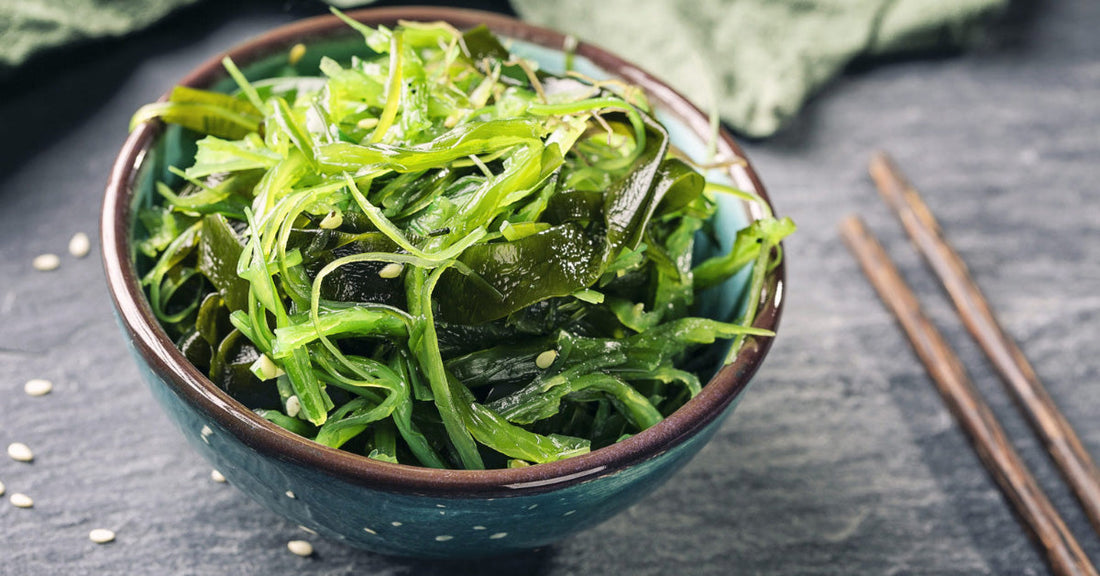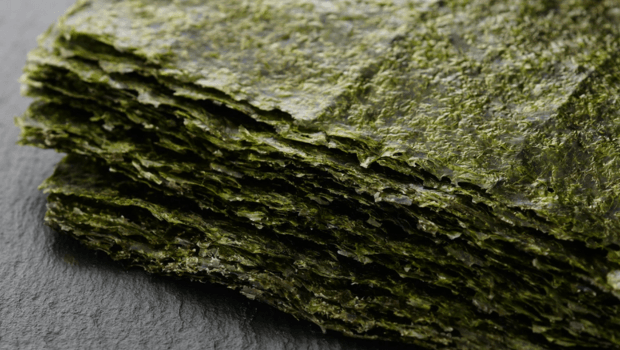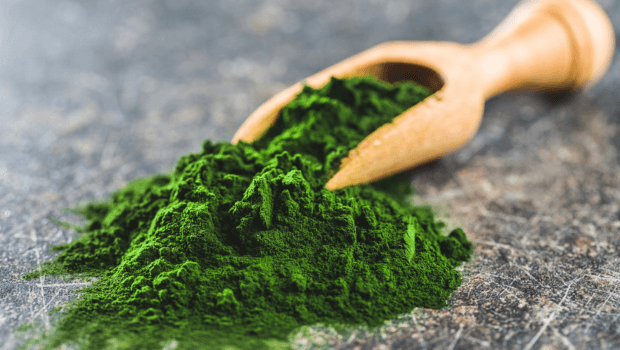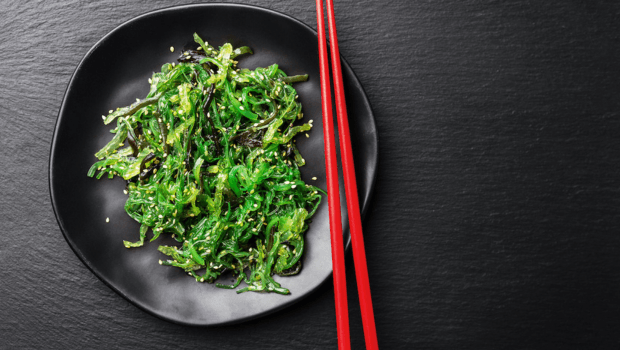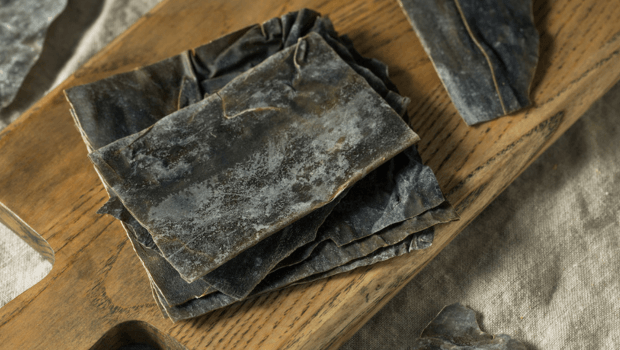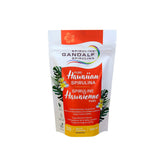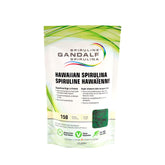For as long as the world has existed, the oceans of the blue planet have been an invaluable source of life. According to the most likely hypotheses, they are even at the origin of human life, no more and no less.
The oceans are teeming with fish, seafood and marine animals, providing essential proteins and fats to feed animals and humans alike. But what about living underwater plants like seaweed? For many, their smell and texture is rather off-putting, but for others who have tamed them, they represent a real culinary delight. And did you know that they have impressive health benefits?
In this article, we'll discuss seaweed and its virtues, as well as the precautions to be taken before consuming it.
The different types of seaweed
There are more than 35,000 different types of algaeContrary to popular belief, not all of them are edible, and like mushrooms, some can be toxic and even fatal.1, 2, 3, 4
Algae come in a wide range of colors, from red to brown, purple to blue and green.1, 3 Their color changes according to their depth and living environment.
Green algae capture sunlight more easily and produce chlorophyll, so they grow closer to the water's surface.1 Chlorophyll is also a blood purifier and a source of magnesium.1 Red algae grow deep in salt water, producing the orange-red antioxidant pigment that is also a precursor of vitamin A.1
Blue-green algae come from freshwater, and their color is conferred by bacteria.1 The best-known are spirulina and chlorella. These freshwater algae contain no iodine, unlike those that grow in salty, iodized environments such as the oceans.1
Seaweed, iodine and the thyroid gland
Seaweed containing high levels of iodine should not be consumed in large quantities by people suffering from thyroid disorders. This is rather paradoxical since, basically, thyroid hormones are made from iodine, so it would seem rather intuitive to take iodine or iodized seaweed.
It's true that it's beneficial for healthy people. Iodine is essential to the functioning of the human body, and iodine deficiency, especially at an early age, causes a physical and intellectual deficiency known as cretinism. But as the saying goes, "too much is like too little", and too much iodine can lead to thyroid imbalance.3
The recommended daily allowance (RDA) for iodine is 150 Ug per day for an adult,6 This corresponds to 5 to 10 g of iodine-rich seaweed per day.5 It is recommended not to exceed 1100 ug per day..6
Note that the Japanese, who are known to be major seaweed consumers, do not exceed 29 g of iodine-rich seaweed per day.5
If you already suffer from hypothyroidism, whether you're taking Synthroid or not, it's best to check with your doctor before taking iodine-rich seaweed, especially in large quantities. For such people, freshwater blue-green algae are rich in nutrients but low in iodine.
Seaweed with a thousand and one virtues
Like other vegetables, seaweed contains proteins, carbohydrates and a little fat. Unlike "normal" vegetables, the carbohydrates contained in seaweed are mainly fibers that cannot be assimilated by the body. These soft fibers therefore promote intestinal transit and help balance blood sugar levels and intestinal flora.1, 3
Impressively, up to 30% of the weight of seaweed is made up of vitamins and minerals. That's a lot more than in vegetables.1, 3 So, we might as well say that we're talking about multivitamins and minerals that can be eaten in a salad or as a snack!
It's thanks to all these nutritional riches that algae have impressive stimulating, anti-fatigue and revitalizing virtues. Others are antimicrobial or antifungal. In addition, some help to reduce stress or promote memory and concentration, while others contribute to digestion, intestinal transit or are downright laxatives.1, 3
The most popular seaweeds and their benefits
Nori
- Latin name : porphyry tenera.
- Other name: Porphyra and purple lettuce
- Contains vitamins: A-B1-B2-B3-B6-B12-C
- Essential minerals and trace elements: magnesium, phosphorus, iron, aluminum, zinc, iodine and sulfur.1
- Without doubt the best known, most appreciated and most widely consumed in the world, it is the seaweed used in sushi.1, 3
- It has to be cooked to be eaten, which is why it's most often found grilled.1
- You'll also find it as a delicious, seasoned snack to please young and old alike.
Chlorella
- Latin name : Chlorella Pyrenoidasa and chlorella vulgaris
- Other name: Chlorella
- Contains vitamins: A-B1-B2-B3-B6-B12-C-E and K
- Essential minerals and trace elements: magnesium, manganese, phosphorus, iron, copper, selenium, zinc and potassium.1
- It contains up to 58% protein!
- It's also high in chlorophyll, which gives it its name "the greenest of greens", and carotene..1
- As it contains no iodine, it is mainly used for its ability to detoxify heavy metals..1, 5
But the properties of chlorella don't stop there, as it also has affinities with the immune system and the intestinal microbiome. In other words, it encourages good intestinal transit while maintaining a healthy balance of bacteria.1, 3
Before using it in large quantities to detoxify heavy metals, it's best to consult a licensed naturopath for guidance.
Spirulina
- Latin name : Spirulina platensis
- Other name: micro-algae, blue-green algae, spirulina
- Contains vitamins: A-B1-B2-B3-B6-B8-B12-C-D-E and K
- Essential minerals and trace elements: magnesium, phosphorus, iron, calcium, zinc and copper.1, 3
Spirulina is a freshwater algae. rich in free amino acids (the smallest part of proteins), which account for 60-70% of its weight!5 It also contains essential fatty acids, antioxidants and chlorophyll. What's more, it's packed with vitamins and minerals, making it an exceptional food.3
And don't forget that since it grows in fresh water, it's iodine-free, so it's not a danger to thyroid problems, and remains safe in high doses.
Its nutritional richness has earned it a place of choice both as a companion for astronauts in space and in the fight against malnutrition.1, 3, 5 In ancient times, it was reserved for pregnant women.1
Hawaiian spirulina is world-renowned for its trace element-rich marine soils, but all organic spirulina is excellent for humans.
Its taste is more discreet than that of iodized algae, but if the taste puts you off, many companies produce it in capsules and even tablets.
Note that it must not be heated.3
Dulse
- Latin name : Palmaria Palmata
- Other names : rhodymenia palmata
- It contains vitamins: A-B1-B2-B3-B6-B12-C and E
- Essential minerals and trace elements: calcium ++ (20X more than milk), magnesium, manganese, phosphorus, iron, selenium, zinc, iodine, silica and potassium.1, 3
-
Sailors in the Middle Ages consumed it to prevent scurvy.1
-
5 g of dried dulse contain around 150ug of potassium.’iodine, c’i.e. the’recommended daily intake.5, 6
Dulse is a tonic seaweed that stimulates the blood and nervous system. Very rich in protein and silica, it promotes the production of connective tissue such as hair, nails, skin and joints.1
It's renowned for its iodized, nutty taste, but if, like me, you're not too fond of it, it goes very well in a soup, quiche or other dish served hot.
Arame
- Latin name : Eisenia bicyclis
- Other name: Sea oak
- Contains vitamins: A-B1-B2-B3 and B12
- essential minerals and trace elements: magnesium, calcium, phosphorus, iron, copper, iodine, zinc and sodium.1
This algae is brown and almost blackIt has a discreet flavor and is perfect for enhancing the nutritional density of your dishes in a subtle way.1, 5
Wakame
- Latin name : Undaria pinnatifida
- Other names: undaria, ouesanne
- Contains vitamins: A-B1-B2-B12 and C
- Essential minerals and trace elements: calcium ++ (20X more than milk), magnesium, phosphorus, iron, sodium, zinc, iodine, silica and potassium.1
This tender, dark-green seaweed stands out for its marine flavor and is often the favorite seaweed of true seaweed lovers.1, 5
Therapeutically, it promotes the elimination of toxins, including heavy metals,3, 5 thanks to alginic acid, which promotes intestinal transit and lowers cholesterol levels.1, 5
Kombu
- Latin name : Laminaria digitata
- Other names: Sorcerer's whip, Neptune's harness, webbed hand, kombou
- Contains vitamins: A-B1-B2-B3-B6-B12-C-E-F and K
- Essential minerals and trace elements: 22% of the dry weight of kombu is made up of minerals: calcium (7X more than milk), iron+ (5 X more than spinach), phosphorus, sodium, iodine++. and potassium.1
- 5 g of dried kombu contain around 150ug of iodine, the recommended daily intake.5, 6
Its rich mineral content makes it an excellent choice for increasing longevity, combating high levels of bad cholesterol and high blood pressure.1 Kombu is also detoxifying, gentle on the digestive system and a natural flavor enhancer.5
Consuming seaweed: precautions to take
Unfortunately, our beautiful oceans no longer have the quality we once knew: plastics, pollution, pesticides, mercury, lead, arsenic and other heavy metals are just a few examples of the unsavory arsenal that roams our waters and intoxicates the people who live there.
So, whenever possible, choose seaweed that has grown in a controlled and above all organic aquaculture environment.
However, if you happen to eat non-organic seaweed, you should be aware that it has to pass health and heavy metal tests before being put on the market.3
Heavy metals
As naturopaths, we get a lot of questions about heavy metals. First of all, it's important to understand that our environment is increasingly contaminated, and that we can't completely protect ourselves from heavy metals.
Certain metals, such as aluminum, bismuth, chromium and silver, are essential to the body's proper functioning when present in trace form. It's when they are absorbed in large quantities, and especially when the body is unable to eliminate the excess, that they become harmful.4
The best way to ensure proper management of metals is to have enough minerals to "buffer" them.4 In fact, metals all have antagonistic minerals that act as magnets to eliminate them.
So there's no need to fear trace metals in foods such as algae, which often provide more protective factors than anything else. Especially if the seaweed comes from a high-quality environment.4
As moderation is advisable in many aspects of life in general, the abuse of seaweed is not beneficial, and a dense, varied and balanced diet remains the key to optimal health.
A mineralogram
If you're curious about your mineral balance and heavy metal content, a hair analysis or "mineralogram" is a very interesting tool. This test, taken from an inch of hair close to the head, is analyzed by a laboratory and measures the content of what has circulated in the body during the period in which the hair has grown. This test, like many others, can be carried out as part of a follow-up with a certified naturopath.4
In conclusion
In this article, I've tried to make you aware of the virtues of seaweed and the safe and beneficial way to consume it. We could also have gone on at length about their cosmetic virtues for external use, and culinary tips. I invite you to explore the books in my bibliography if you're so inclined.
About the author
Marie-France Trudelle, Certified Naturopath
In-depth knowledge of :
- Nutrition and dietary supplements
- Stress management and sleep
- Physical activity and movement
- Massage therapy
Resources
- Teubner, Geraldine, Les algues, un monde à découvrir, les éditions Quebecor, 2004, 120 pages
- Bardoulat, Maria, Les bienfaits de la mer, éditions Alpen, Monaco, 2006, 95 pages.
- Crépeau, Catherine, Les vertus miraculeuses des algues, Les éditions De L'homme, 2014, 142 pages
- Guénette, Lise ND.A., Analyse naturopathique; minéralogrammes, IESN, 2014
- Dougond Chavannes, Carole, Les algues de A à Z, Les éditions Jouvence, 2013, 221 pages
- https://www.passeportsante.net/fr/Nutrition/PalmaresNutriments/Fiche.aspx?doc=iode


